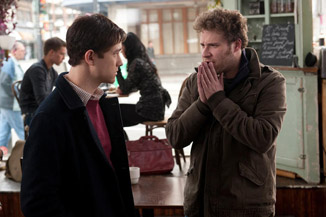|
|
Movie Review: 50/50By Matthew HuntleyOctober 11, 2011
Along with Gordon-Levitt, Huston provides the movie its authenticity and makes us feel like we’re actually watching real people, which is why it eventually hooks us and sparks a moderate emotional response. Their characters contrast with Rogen and Howard’s, who are more stock movie types with pre-defined roles. Rogen is his usual self, once again playing the loudest guy in the room and giving the movie its comic relief by making obscene comments and referencing popular culture (he’s quick to name all the celebrities who’ve beaten cancer). This may be Rogen’s specialty, but it’s getting old. And while Howard is a fine actress, her character is dispensable because she’s simply the blatant jerk. The screenplay doesn’t give her the chance to be anything else. Much more interesting is Katherine, played with sweet sincerity by Anna Kendrick. She’s Adam’s 24-year-old therapist, and while Katherine may go by the book, she has noble intentions and an even bigger heart, a quality to which Kendrick lends complete credence. She has such an amiable and winning screen presence, we yearn for the day she gets her own starring role. 50/50 doesn’t seem interested in being a detailed account of what a cancer patient goes through, but rather how we deal with life’s curve balls in general. It’s not about the cancer as much as the human reaction to such ordeals and how something that affects us personally can and will affect everyone around us. This notion is nothing new, but the movie presents it with poignancy and comedy so it becomes entertaining and we appreciate that it doesn’t submit to hokey or forced sentimentality. It feels more real than artificial and director Jonathan Levine, who last made the underappreciated The Wackness, has a knack for revealing the humans behind unimaginable hurdles. After the movie’s most crucial scene, the lesson I took away is we’re probably more loved by others than we think. That love is not always expressed to us, but perhaps after seeing 50/50, when we realize that life can change in an instant, we’d all be more willing to open ourselves up and say what we feel. What a wonderful thing that would be.
|

|
|
|

|
Thursday, October 31, 2024
© 2024 Box Office Prophets, a division of One Of Us, Inc.


